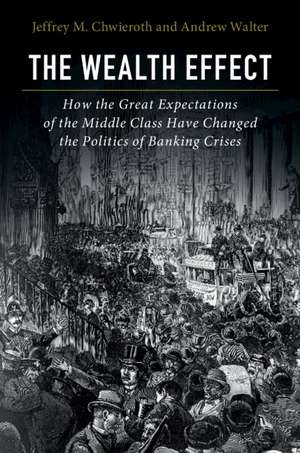The Wealth Effect: How the Great Expectations of the Middle Class Have Changed the Politics of Banking Crises
Autor Jeffrey M. Chwieroth, Andrew Walteren Limba Engleză Hardback – 20 mar 2019
Preț: 749.24 lei
Preț vechi: 871.21 lei
-14% Nou
Puncte Express: 1124
Preț estimativ în valută:
143.43€ • 147.51$ • 118.99£
143.43€ • 147.51$ • 118.99£
Carte tipărită la comandă
Livrare economică 17 februarie-03 martie
Preluare comenzi: 021 569.72.76
Specificații
ISBN-13: 9781107153745
ISBN-10: 1107153743
Pagini: 596
Ilustrații: 103 b/w illus. 18 tables
Dimensiuni: 155 x 235 x 36 mm
Greutate: 0.95 kg
Editura: Cambridge University Press
Colecția Cambridge University Press
Locul publicării:New York, United States
ISBN-10: 1107153743
Pagini: 596
Ilustrații: 103 b/w illus. 18 tables
Dimensiuni: 155 x 235 x 36 mm
Greutate: 0.95 kg
Editura: Cambridge University Press
Colecția Cambridge University Press
Locul publicării:New York, United States
Cuprins
Part I. Banking Crises and the Rise of Great Expectations: 1. Great expectations, banking crises, and democratic politics; 2. Great expectations: banking crises, policy responses and politics; 3. Household wealth and financialization in the United Kingdom, the United States and Brazil since the nineteenth century; 4. The emergence of great expectations in the United Kingdom, the United States and Brazil; Part II. Evolving Policy Responses to and Political Consequences of Banking Crises since the Nineteenth Century: 5. Changing expectations and policy responses to banking crises; 6. Banking crises and voters over the long run; Part III. Banking Crises, Policy and Politics in the United Kingdom, the United States and Brazil since the Nineteenth Century: 7. Banking crises in the United Kingdom in an era of low expectations; 8. A banking crisis in the United Kingdom in an era of great expectations; 9. Banking crises and politics in the United States before 1945; 10. The 2007–2009 crisis and its aftermath in the United States; 11. Banking crises in Brazil in an era of low expectations; 12. Banking crises in Brazil in an era of rising expectations; 13. Conclusion.
Recenzii
'Special-interest politics figure importantly in all scholarly analyses of the causes and resolution of financial crises. Marshalling an amazing array of historical, statistical and narrative evidence, Chwieroth and Walter show that this point applies not just to the bankers who are commonly seen as the key players in these complex financial events, but also to the households whose deposits and savings are at risk. This observation has powerful implications for how financial crises play out in our modern era of mass democratic politics. The literature on financial crises will never be the same.' Barry Eichengreen, George C. Pardee and Helen N. Pardee Professor of Economics and Political Science, University of California, Berkeley
'The global pandemic of banking crises, and government-sponsored bailouts in response to those crises, are both unprecedented phenomena. Such new and socially costly phenomena beg for deep inquiry by political scientists seeking to understand their political roots, and The Wealth Effect offers just such an inquiry. It argues convincingly that bailouts and the severity of crises are connected to each other, and both reflect a new underlying politics in which the protection of banks has become popular with a broad class of voters. This book challenges mechanical views of risks that abstract from politics, and in doing so, calls upon voters in democracies to look in the mirror when seeking causes for their financial system, and fiscal, troubles.' Charles W. Calomiris, Henry Kaufman Professor of Financial Institutions, Columbia University, New York
'A fascinating and novel argument about the politics of finance before and after the Great Recession. Tracing the development and effects of a an enlarged 'bailout' constituency, involving both wealthy and middle class citizens, this book offers valuable lessons about finance, class politics and the workings of democracy.' Nancy Bermeo, University of Oxford and Princeton University
'The global pandemic of banking crises, and government-sponsored bailouts in response to those crises, are both unprecedented phenomena. Such new and socially costly phenomena beg for deep inquiry by political scientists seeking to understand their political roots, and The Wealth Effect offers just such an inquiry. It argues convincingly that bailouts and the severity of crises are connected to each other, and both reflect a new underlying politics in which the protection of banks has become popular with a broad class of voters. This book challenges mechanical views of risks that abstract from politics, and in doing so, calls upon voters in democracies to look in the mirror when seeking causes for their financial system, and fiscal, troubles.' Charles W. Calomiris, Henry Kaufman Professor of Financial Institutions, Columbia University, New York
'A fascinating and novel argument about the politics of finance before and after the Great Recession. Tracing the development and effects of a an enlarged 'bailout' constituency, involving both wealthy and middle class citizens, this book offers valuable lessons about finance, class politics and the workings of democracy.' Nancy Bermeo, University of Oxford and Princeton University
Notă biografică
Descriere
Shows how the politics of banking crises has been transformed by the growing 'great expectations' among middle class voters that governments should protect their wealth.
